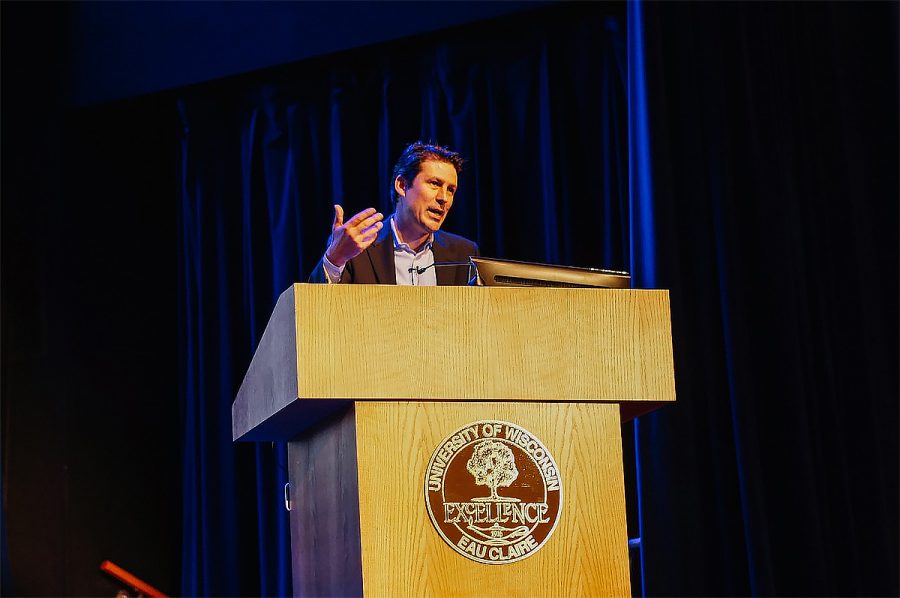The Forum: David Madland talks income inequality
Expert discussed possible dangers and what’s at stake in November election
September 22, 2016
UW-Eau Claire started its 75th Forum season with nods to the university’s centennial celebration and the current state of politics: A century-long look at income inequality and its effects on modern American society.
Dr. David Madland, an author and expert specializing in economic policy, economic inequality and the middle class, was the first speaker for the 2016-17 Forum series 7:30 p.m. Wednesday at Schofield Auditorium with his presentation “A 100 Year Reflection on Income Inequality.”
Kristin Schumacher, UW-Eau Claire’s facilitator for the Forum series, said Madland’s area of study would be especially relevant with the upcoming presidential election, as candidates will debate topics including income inequality.
“The committee knew Madland could give a historical perspective and a ‘100 year look back’ about income inequality and knew it was a perfect fit,” Schumacher said.
Madland’s presentation also gained a greater sense of pertinence and immediacy after the U.S. Census Bureau recently released its 2015 Income and Poverty Report, on Tuesday, Sept. 13.
The report revealed that relative to past years, substantial gains were made in median household income, especially households in the lowest quintile.
In an article co-authored by Madland, he revealed the median household income for 2015 was $56,516, a 5.2 percent increase from 2014.
Is it time to pop the champagne? Madland said that may be premature.
Despite these gains, Madland said in the article that during the years following the Great Recession, the wealthy still secured much of the income growth. His talk at the Forum addressed one particular question: is inequality necessary for a thriving economy?
Income inequality is not a new phenomenon in the United States. As far back as the foundation of the United States, Madland said, it was a “very middle-class country.” The strength of the middle class fluctuated throughout history but it’s a different story today.
“We’re now the most unequal advanced country in the world,” Madland said, citing the fact that middle class wages are the same as they were in the 1970s, costs for necessities like housing and education are rising and debt has doubled over past decades.
The United States is in a very similar financial situation to 100 years ago, Madland said, and strengthening the middle class is the key. Madland listed four ways that the middle class will facilitate the nation’s future success.
First, fostering an ability to trust people. This has been declining in the nation, Madland said, citing extreme inequality as part of the problem.
“Inequality pulls people apart,” Madland said. “It makes them seem different from you. They have more different lives so you’re less willing to think of them as like you, so you’re less willing to trust them.”
Second, is the quality of our government. Madland said that as the wealthy grow wealthier, they also gain more power. Today, it manifests itself in the widespread pressure and manipulation of members of the legislature.
Congress, Madland said, often caters to the desires of the wealthy. Madland also pointed to increased polarization between political parties and an unwillingness to compromise. As a result, Americans are growing disillusioned with the current political structure and, in turn, are increasingly less active as civic participants, of which one form of evidence is low voter turnouts.
She said cutbacks investing in infrastructure and education are detrimental to the middle class and the United States’ future growth.
Madland’s third point of focus is consumer demand; consumers need money for businesses to invest and create jobs, an aspect of the economy that has grown stagnant since the 1970s when wages stopped rising, costs inflated and consumers went into debt.
“It created a huge implosion that took the whole country down,” Madland said, “because people couldn’t pay back the loans they had taken out and they reduced the amount of consumption that there was in the economy.”
As consumers were purchasing less, businesses couldn’t hire as many people or feel secure enough to make long-term investments.
Another area of focus is developing human capital, which he described as the “skills and knowledge people use to solve problems.” Madland claimed America fails to take advantage of people’s talents.
A key way in which people’s talents are developed, Madland said, is through education. He credited much of educational success today to the economic state of families, who are able to invest varying amounts of money in education dependent on their resources as children from wealthier families are outscoring children from middle-class families.
Madland said his ideas are radically different than the thinking of economists 30-40 years ago, when they generally thought economic inequality was good and spurred competition. Now, most economists agree that inequality is harmful to economic growth.
“I think the stakes of losing, of not investing in the middle class at this moment, are even greater than they were,” Madland said, placing special emphasis of the problem in the context of the upcoming presidential election.
Donald Trump as president, Madland said, could be detrimental to basic democratic values of the United States.
Madland provided some suggestions to help restore the middle class: equalize political power; invest in education, especially at the early stages; and make work pay again, so workers benefit when their business succeeds.
Madland concluded with a warning and a message of hope:
“Unless we do something to strengthen the middle class and get more people in the middle class, we face grave danger for the future of our country,” he said. “But I also want you to be a little optimistic in that we can do things. We have the ability to fix this.”
Bethany Benzschawel, a freshman nursing student, said Madland’s presentation gave her a lot to think about pertaining to her future after college. She was especially interested in how economic inequality affected education performance.
“I was really interested in how he said wealthy with even mediocre scores were more likely to finish than people who are middle class with high test scores,” Benzschawel said.
The Forum series will continue at 7:30 p.m. on Wednesday, Nov. 16 at Schofield Auditorium with travel writer and public television host Rick Steves presenting on “European Takes on America’s War on Marijuana.”



